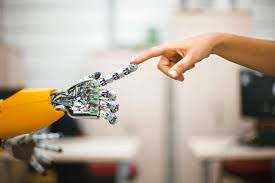Source – forbes.com
Will people and AI-powered machines ever get along? When it comes to artificial intelligence and machine learning, the prevailing fear is that it will take jobs away. However, a pair of Accenture thought leaders suggest a different, far less dystopian future in an AI and machine learning-driven business world. That is, artificial intelligence and machine learning systems, working with humans, may actually make jobs more fun, rewarding and interesting.
Organizations that put AI to work in this way will lead their industries. However, making AI work in new and wondrous ways requires a powerful sense of imagination. In their latest book, Human + Machine, Paul Daugherty and H. James Wilson say that as humans and smart machines collaborate ever more closely, work processes become more fluid and adaptive, enabling employees and companies make changes on the fly — or even to completely re-imagine them.
Daugherty and Wilson explored the practices and approaches of 1,500 organizations, and found achieving success with AI is as much an exercise in imagination as it is in technical prowess.
Imagine new and bold processes. “When trying to re-imagine a process, it’s natural for people to become stuck on the old ways of doing things, making it difficult to envision things that might be,” the authors state. “To avoid that, they should always keep in mind the differences between traditional business processes versus the new, AI approach. Our research shows that outcomes are no longer linear but exponential. Change is no longer episodic and human-led; it’s self-adaptive, based on real-time input from humans as well as machines. Roles are not just limited to human-only and machine-only positions; they must also include collaborative work in the missing middle.”
Imagine and experiment. “In science, an experiment that doesn’t support the hypothesis isn’t called a failure. It’s called data,” Daugherty and Wilson point out. This is the mindset that should be applied to designing new business processes.”The age of the standard business process is over; companies can no longer aim to replicate the best-in-class process of an industry leader,” they state. “That’s why experimentation is key. The catch, though, is that tailor-made processes require managers and leaders be more aware of their workforce and culture at large so they know how and when to implement experiments.”
Imagine a blended culture of people and machines: Trust is the key in a blended culture, the authors state. “How do you foster a culture of trust that extends even to robo-colleagues? One way is to test with AI and train with it. To engender a trust in AI systems, leaders to allow for those who work with systems to develop stakes in the outcome and to have a sense of urgency over the inner workings of the system. Ideally, AI systems should generally be designed to offer explanations of their decisions and to help people maintain some decision-making autonomy. Developing processes that are fundamentally trust-based takes time and experimentation, but case studies show that if all parties are trusted — humans, machines, and humans and machines working together — then outcomes can improve for everyone.”
Imagine a data supply chain. “Are only analysts and data scientists benefiting from analysis tools? Your goal should be to extract insights in such a way that anyone, especially less-technical business users can take advantage of the story data is trying to tell. Imagine data as an end-to-end supply chain…. a fundamentally new way of thinking about data, not as a static process that’s managed separately in silos across organizations but as a dynamic enterprise-wide activity for capturing, cleaning, integrating, curating, and storing information.”
